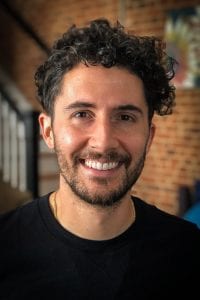By Eric A. Clayton
We spent much of the morning setting up the cameras and the lights and checking the sound equipment. Sun spilled in through the floor-length windows casting doubt on the necessity of the lights we’d pulled out of storage. But we kept them up just to be safe.
Alejandro Calderón was in town and stopping by the Jesuit Conference offices. I’d never met him. I knew nothing more than that he worked for Fe y Alegría, a network that fights for education for some of the most vulnerable communities around the globe. Alejandro is the director of the team in El Salvador.
He seemed like someone worth getting in front of a camera.
Alejandro arrived, accompanied by a colleague from Magis Americas – a key partner of Fe y Alegría. Alejandro was bundled up against the February cold, his hair tied back in a bun, his glasses fogging beneath his mask. We ushered them both into our conference room, offered them some hot coffee. I sat at the far end, listening.
Alejandro knows his stuff – that much became immediately clear. He rattled off stats about educational outcomes in El Salvador, the impact of Covid-19 on the rate of poverty in the country and shared firsthand accounts of what he’s heard from some of the most vulnerable students in the world. And he did all of this in a language that was not his first.
But the thing about Alejandro that most struck me was his background. Here’s this young guy at the helm of this important nonprofit, trying to change the future of countless young people and their families across El Salvador. You might think – as I did – that he’d be an expert in finance or management or nonprofit leadership.
His background is in psychotherapy.
Now, he has plenty of lived experience working with and for nonprofits in general and Fe y Alegría in particular. But it’s this sensitivity to and concern for the mental health of both his team members and the community members he serves that stayed with me.
Alejandro knows that a person can’t fully thrive if they’re not able to care for their mental wellbeing.
So, when we left the conference room and sat Alejandro down in front of those highly unnecessary lights, I asked him about it. You can see what he said in this video.
What I take away from Alejandro’s reflections is that the Ignatian practice of cura personalis – the care of the whole person – sometimes pops up in places we least expect.
Sure, when you’re in front of a classroom, it’s easy to lecture students on caring for their whole selves. When you’re in the locker room, preparing for practice, that care of the whole person might be front of mind. When you’re taking some time to yourself, you might think, “Hey, I’m practicing a little Ignatian spirituality!”
But when a colleague is unable to make the commute into the office? When policies prioritize procedures over people? When our team members aren’t able to care for others because they haven’t been able to properly care for themselves?
There are plenty of other good examples of opportunities to practice cura personalis in ways and places that might not be immediately obvious. But ultimately, we would do well to pause and reflect: Are we caring for ourselves in all the multifaceted ways that our lives demand? And, are we caring for others in that same way?
In short, are we loving our neighbor as we love ourselves? And is that love an expression of the love of our God who delights in our very being?
If not, let’s take some time to work out why – and how we might change.
This reflection is part of a weekly series that you can get sent right to your inbox by signing up at Jesuits.org/weekly.


